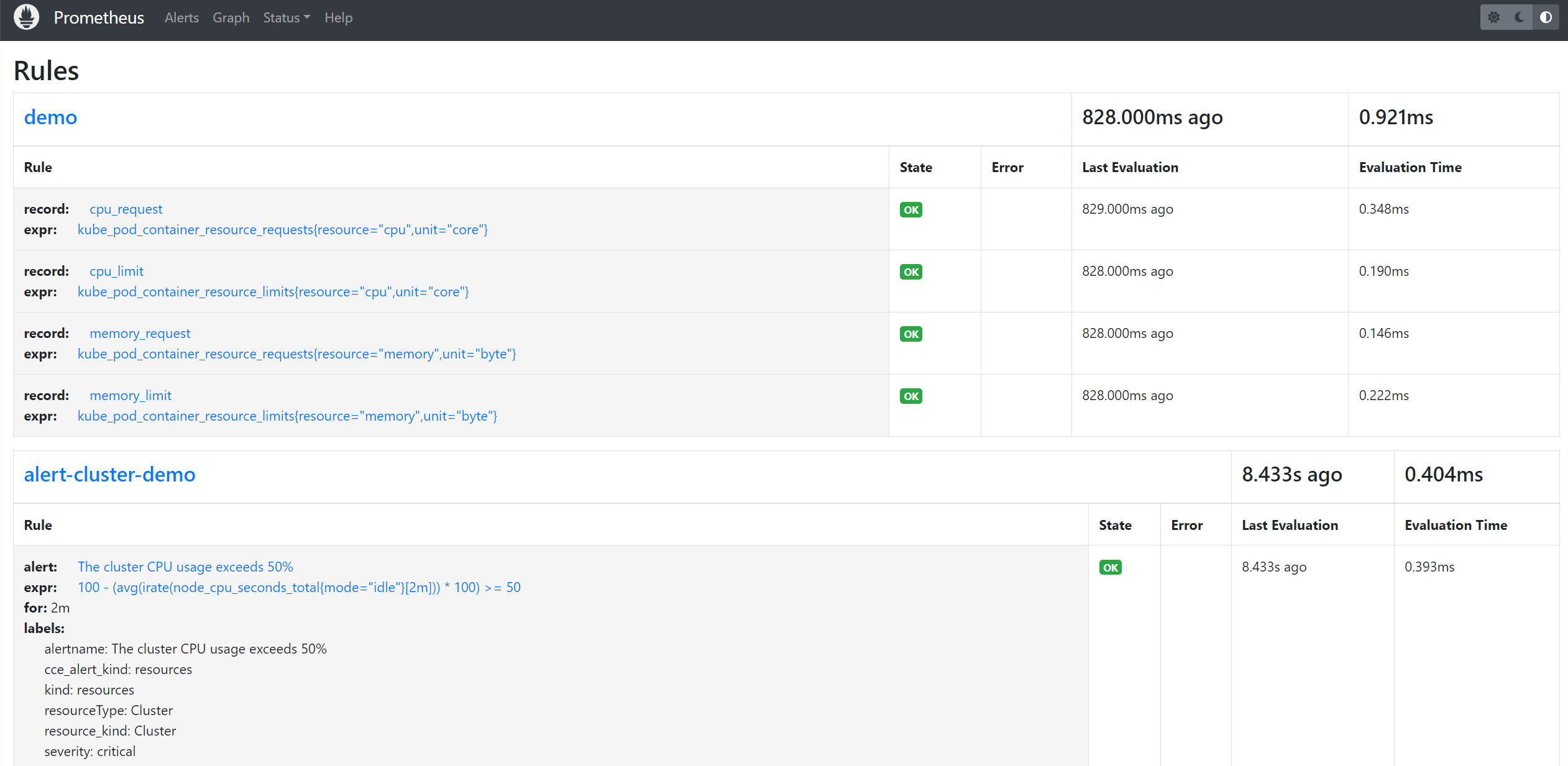Configuring Monitoring and Alarm Rules Using PrometheusRule
Prometheus provides PrometheusRule that defines monitoring and alarm rules. This allows you to better use Prometheus to query metrics based on monitoring rules and configure PromQL-based alarm rules.

Currently, PrometheusRule is only available when the Cloud Native Cluster Monitoring add-on works with local data storage enabled.
How Do I Configure Monitoring Rules Using PrometheusRule
- Create monitoring rules to query metrics using PrometheusRule.
apiVersion: monitoring.coreos.com/v1 kind: PrometheusRule metadata: name: demo namespace: monitoring labels: role: operator-prometheus # (Mandatory) The value must be the same as that of the ruleSelector field configured in the Prometheus CR. spec: groups: - name: demo interval: 15s rules: - record: cpu_request expr: kube_pod_container_resource_requests{resource="cpu",unit="core"} - record: cpu_limit expr: kube_pod_container_resource_limits{resource="cpu",unit="core"} - record: memory_request expr: kube_pod_container_resource_requests{resource="memory",unit="byte"} - record: memory_limit expr: kube_pod_container_resource_limits{resource="memory",unit="byte"} - Access the Prometheus web page and choose Status > Rules. On the displayed page, query the configured monitoring rules.

How Do I Configure Alarm Rules Using PrometheusRule?
You can configure a Prometheus custom resource (CR) that includes a PrometheusRule object to create alarm rules. The following uses the cluster CPU usage as an example to describe how to create an alarm rule template. For details, see https://prometheus.io/docs/prometheus/latest/configuration/alerting_rules/.
- Create an alarm rule template.
kubectl apply -f PrometheusRule.yaml
Example configuration of PrometheusRule.yaml:
apiVersion: monitoring.coreos.com/v1 kind: PrometheusRule metadata: labels: role: operator-prometheus # (Mandatory) The value must be the same as that of the ruleSelector field configured in the Prometheus CR. name: demo namespace: monitoring spec: groups: - name: alert-cluster-demo rules: - alert: The cluster CPU usage exceeds 50%. expr: 100 - (avg (irate(node_cpu_seconds_total{mode="idle"}[2m])) * 100) >=50 for: 2m labels: severity: critical cce_alert_kind: resources alertname: Cluster CPU usage exceeds 50% kind: resources resource_kind: Cluster resourceType: Cluster source: prometheus annotations: info: "The actual CPU usage of the cluster exceeds 50%. The current CPU usage of the cluster is {{ printf \"%.2f\" $value }}%". description: "The actual CPU usage of the cluster exceeds 50%. The current CPU usage of the cluster is {{ printf \"%.2f\" $value }}%". - Access the Prometheus web page and choose Alerts. On the displayed page, check whether the alarm rules are triggered or take effect.

- The Prometheus add-on automatically pushes alerts to the Alertmanager. If you want to configure the alert recipient, you can configure the key named alertmanager in the monitoring namespace. For details, see the Alertmanager document at https://prometheus.io/docs/alerting/latest/configuration/.


As shown in the alertmanager-alertmanager StatefulSet YAML file, the alarm data is stored in the pod disk. However, if the pod is restarted, the alarm data will be lost. If you want to persistently store the data, create a PVC and mount it to the pod, and modify the CR of the Alertmanager.
Feedback
Was this page helpful?
Provide feedbackThank you very much for your feedback. We will continue working to improve the documentation.






